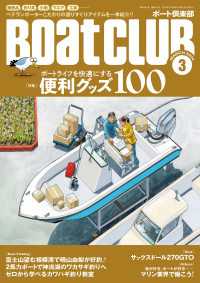- ホーム
- > 洋書
- > 英文書
- > Philosophy
Full Description
This volume brings together 138 of Leibniz's writings on four key areas of philosophy-metaphysics, natural philosophy, ethics, and jurisprudence. His metaphysical writings trace the development of some of his most distinctive doctrines such as the complete concept theory of substance, preestablished harmony, the nature of human and divine freedom, and the infinite analysis of contingent truths. Leibniz's writings on natural philosophy reveal a conviction that the principles of physics ultimately depend on those of metaphysics and his efforts to develop a rational physics grounded not in experiments but in an a priori investigation of intelligible and sensible qualities, such as figure, motion, and colour. The ethical writings focus on happiness, the role of virtue, and the importance of adopting others' perspectives. Meanwhile, Leibniz's jurisprudential works centre on his ambition to create a systematic, rational foundation for law and his plan to reform legal codes by integrating Roman law with modern European jurisprudence.
This collection traces the evolution and interconnection of these ideas and projects during Leibniz's formative first decade in Hanover (1677-1686), and is the most extensive collection of such writings in English to date. Strickland has returned to Leibniz's original manuscripts to produce accurate, carefully annotated translations that document textual variations, deletions, and marginalia. Of the 138 texts included, 88 appear in English for the first time, and one has never been published in any language.
In addition to the translations, the volume features a substantial introductory essay on Leibniz's life, work, and writings on metaphysics, natural philosophy, ethics, and jurisprudence from 1677 to 1686, along with detailed explanatory notes on each text, providing context, background, and the rationale for their dating.
Contents
Abbreviations
Introduction
1. Leibniz's Life
2. Leibniz's Writings
3. Overview: Metaphysics, Natural Philosophy, Ethics, and Jurisprudence
4. About the Volumes, Selections of Texts, Apparatus and Typographical Conventions
Metaphysics
1. Mostly Metaphysical Notes
2. That Not All Possibles Attain Existence
3. Demonstration that God Understands All Possibles
4. Existence
5. On Indifference of Equilibrium
6. Matter and Motion Are Only Phenomena
7. It Is Easier to Understand God Than Comprehend Body
8. Cartesianism, the Antechamber of True Philosophy
9. The Elements of True Piety, or, on the Love of God Above All Things
10. How the Soul Acts On the Body
11. The Distinction Between Mind and Body
12. On Necessary or Eternal Truths
13. On the Reality of Truth
14. The Views of Socrates Opposed to the New Stoics and Epicureans
15. On Those Things Conceived Through Themselves
16. The Axiom: There Is Nothing in the Intellect That Was Not in the Senses
17. On Distinct Perception
18. What Is an Idea?
19. Cause of Itself
20. Middle Knowledge
21. Conversation with Steno about Freedom
22. On the Necessity of Choosing the Best
23. On Proving Divine Existence
24. God Wills Nothing Without a Reason
25. Created Things are Actually Infinite
26. On Free Will
27. On the Complete Concept of Substances
28. Natural Philosophy and Metaphysics: Definitions and Reflections
29. On Affects
30. On First Truths
31. On Necessity and Contingency
32. On Freedom from Necessity in Choosing
33. The Origin of Souls and Minds
34. An Observation on the Memory and Unity of a Person
35. Whether Bodies Are Mere Phenomena
36. On Freedom and Grace
37. On Freedom and Necessity
38. On What is Absurd, False, and Problematic in Descartes
39. On the Notion of Extension
40. On the Infinite and the Immense
41. Reflexive Action
42. Remarks on Mr. Descartes' Method and on Reverend Father Malebranche's The Search After Truth
43. On Consciousness and Memory
44. On the Animal's Soul
45. Dangerous Opinions in Descartes
46. On the Nature of Mind and Body
47. Wonders about the Nature of Corporeal Substance
48. On the Analysis of Truths and Human Judgements
49. On Cartesian Philosophy, Geometry, and Physics
50. Descartes Lost Sight of True Analysis
51. On the Cartesian Method of Doubt
52. Souls Are Either Created Every Day or Are Coeval with the World
53. Difficulties concerning the Nature and Origin of Souls
54. On the Creation of Souls and the Origin of Minds
55. On Dreams and Wakefulness
56. On the Present World
57. On the Way of Distinguishing Real Phenomena from Imaginary
58. Pleasure. An Observation Against Descartes
59. Pleasure
60. We Always Perceive Our Body
61. On Nature, or the Principle that is Analogous to the Soul
62. God is Not the Soul of the World
63. On the Goodness of God's Works
64. Meditations on Knowledge, Truth, and Ideas
65. In Bodies There Is No Perfect Shape
66. On Rejecting the Particular Will of God, Against Malebranche
67. There Can Be Infinite Degrees Among Souls
68. A Vindication of Divine Justice and Human Freedom
69. Discourse on Metaphysics
70. On Knowledge )
71. On the Freedom of the Rational Creature
72. On Freedom, Fate, and God's Grace
73. On the Nature of Truth, Contingency, and Indifference, and on Freedom and Predetermination
Natural Philosophy
74. Parts of Physics
75. On the Equipollence of Cause and Effect
76. That Every Endeavour is Conserved
77. Space and Motion are Really Relations
78. That Motion Is a Relative Being
79. Pushed Bodies Act by Themselves
80. On the Way to Reach the True Analysis of Bodies and the Causes of Natural Things
81. Animal Machine
82. The Secret of Physical Analysis
83. The Laws of Nature, and Observations concerning Motion
84. On Distinct and Confused Attributes of Body
85. Physical Truths
86. Conspectus for a Little Book on the Elements of Physics
87. Preface for a Little Book on the Elements of Physics
88. The Principles of Mechanics Depend on Metaphysics
89. A Plan for Writing a Natural History
90. A Consultation about the Promotion of the Knowledge of Nature for the Needs of Life, and about the Formation of a Society for This Purpose
91. The Human Body, Like That of Any Animal, Is a Sort of Machine
92. On Writing the New Elements of Medicine
93. A Brief Demonstration of a Remarkable Error of Descartes and Others Concerning a Law of Nature, According to Which They Claim that God Always Conserves the Same Quantity of Motion, a Law They Misuse Even in Mechanics. Communicated in a Letter Dated 6 January 1686. By G. W. L.
Ethics
94. A Note on Placcius and Fabri
95. On Lying and Mockery
96. A Way to Heighten the Appearance of Something
97. On Excusing and Accusing
98. On Vices in Comedies
99. On the Art of Injuring
100. Power, Prudence, Reason of State
101. Reward. Honour. Praise
102. Supreme Happiness, Highest Good, Ultimate End: How They Differ
103. The Highest Good
104. Happiness. Beatitude
105. Good
106. The Sense of Life
107. On Spiritual Exercises
108. The Place of Others
109. Importunate Reflections on Human Misery
110. On the Art of Controlling the Passions
111. Examples of Happy Men
112. Plan for the Education of a Prince
113. On the Education of a Prince
114. On Generosity
Jurisprudence
115. On Jurisprudence
116. On the Enumeration of All Possible Complaints
117. The Method of Jurisconsults as an Exemplar for the Method of Medicine
118. Disputing in Form
119. Commonplaces
120. On Inquiring into the Reasons for Laws
121. Title 1. On Justice and Law
122. On the Interpretation, Reasons, Application, and System of Laws
123. On the Three Precepts of Eternal Law
124. Modalities and Elements of Natural Law
125. Modalities and Definitions
126. Rationale of the Digests. Prelude
127. Works of Jurisprudence Intended for Practical Use Must Be Known to a Practitioner
128. Aphorisms concerning Happiness, Wisdom, Charity, and Justice
129. The Principles of Natural Law
130. On the Analysis of Thoughts
131. On Right and Justice
132. On Justice and Writing a New Code of Laws
133. On the Common Good
134. On the Science of Natural Law
135. On Reducing the Law to an Art
136. The Science of Charity and the Supreme Rule of Right
137. On Justice and Love and the Will of God
138. Preface for a New Code
Bibliography
Index







